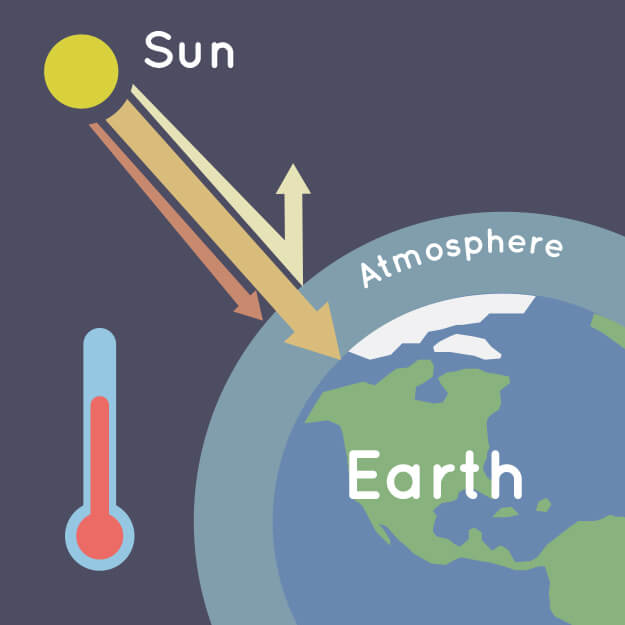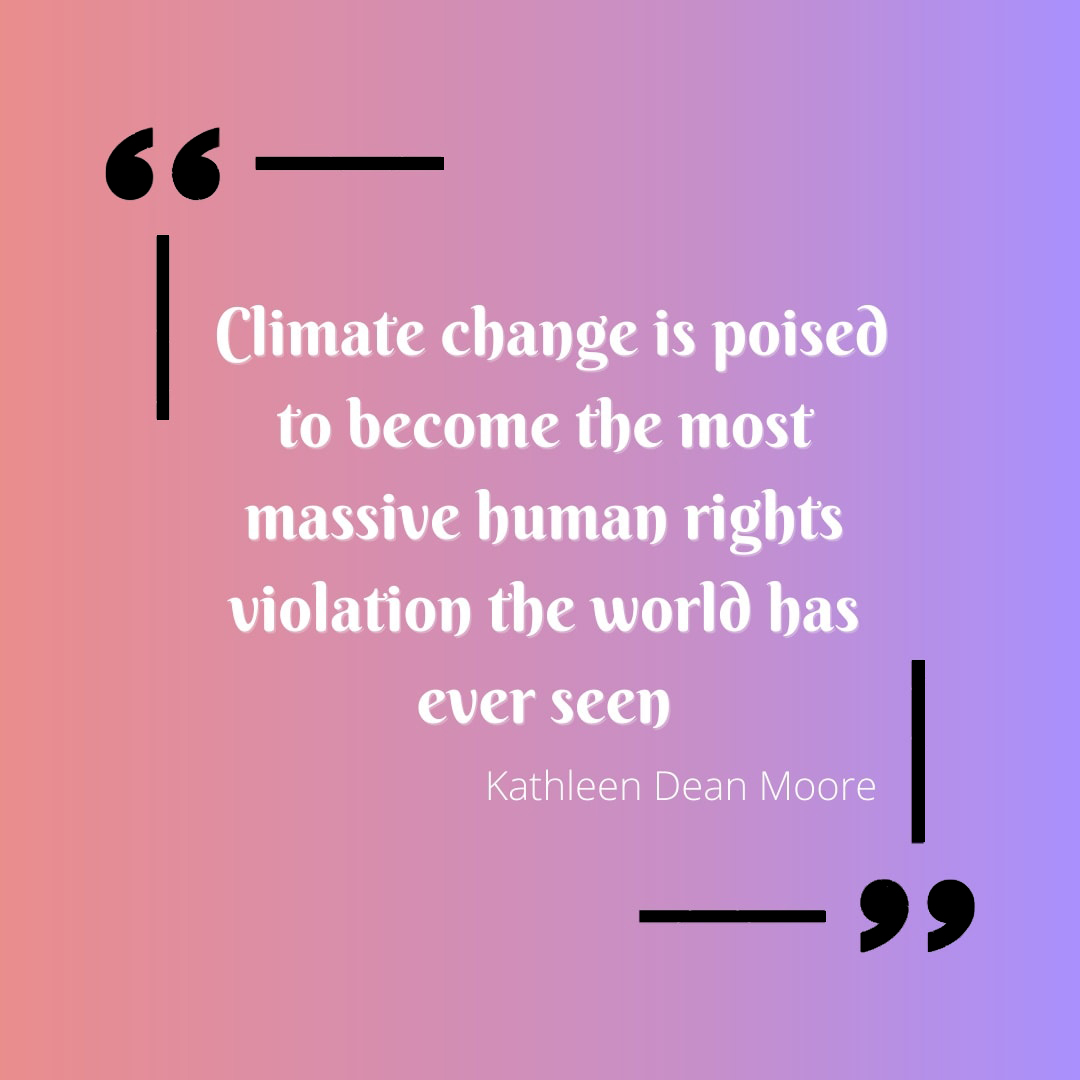What is the difference between weather and climate?
Ok, first things first…So weather according to the Cambridge Dictionary is “the conditions in the air above the Earth such as wind, rain or temperature, especially at a particular time over a particular area” [1], while climate is the general weather conditions usually found in a particular place” [2]. In other words, weather is what is happening today, and climate is what is happening for the past 30 years. Imagine it like that: weather is a screenshot of a specific time, while climate is like a video over the years.
What is climate change?
The United Nations define climate change as “long-term shifts in temperatures and weather patterns” [3]. These changes may be caused by natural forces (such as variations in the solar cycle, volcanic eruptions) or anthropogenic forces (such as burning of the fossil fuels).
What are the fossil fuels?
The fossil fuels are coal, oil and natural gas.
What is the difference between climate change and global warming?
The terms are usually used interchangeably. However, in a 2015 study, Kennedy and Lindsey described global warming as “the Earth’s rising surface temperature”, while for climate change the authors clarified that it includes the warming and the “side effects” of warming” (for instance, extreme events, sea level rise etc. In other words, global warming is “one symptom of the larger problem of human-caused climate change” (Kennedy and Lindsey, 2015). So climate change is the bigger problem that includes global warming.
What are greenhouse gases?
The United Nations define greenhouse gases as “the atmospheric gases responsible for causing global warming and climate change” [4]. The greenhouse gases include
- Carbon Dioxide (CO2), methane (CH4),
- Nitrous Oxide (N2O),
- Ozone,
- Water vapour, and
- Chlorofluorocarbons (which are basically chemicals created by humans that include chlorine, hydrogen, fluorine, or carbon; they do not exist in nature in natural forms).
How are the greenhouse gases created?
They are created mainly due to the burning of fossil fuels. Human activities need energy for everyday life. The energy is created by burning fossil fuels.
Which is the worst greenhouse gas?
Well, I do not have a straightforward answer. It depends on 1. How much of each gas there is in the atmosphere, 2. What is the ability of each gas to trap solar radiation (sunlight), 3. How long does each gas stay in the atmosphere (its lifetime), 4. Which region of the planet are we talking about (for instance, the Intergovernmental Panel on Climate Change (IPCC) [5] that water vapour has larger effect on the dry polar regions than on the humid equatorial regions).
What is the greenhouse effect?
Think of Planet Earth. Around the Earth, there is its atmosphere. Think of it as the blanket that “covers” the planet (Figure 1). The sunlight comes into the atmosphere. Approximately one third of the solar radiation is absorbed by the Earth, keeping the temperature stable (that is why according to NASA [6] the Earth has an average temperature of 15 degrees Celsius). The rest of the sunlight is reflected back to space. Up until that point the greenhouse effect is natural. Otherwise, the temperature of the planet would be -20 degrees Celsius [7]. However, the excess amount of greenhouse gases in the atmosphere traps more sunlight (instead of letting it reflect back to space), raising the average temperature of the Earth’s surface. Imagine the blanket becoming thicker when more gases enter the atmosphere. So, while the greenhouse effect is natural, the human activities increase the solar radiation that is trapped in the atmosphere.


Is greenhouse effect natural or human made?
It is partly natural (stabilizing the Earth’s temperature) and partly human made (due to excess greenhouse gases).
We are running the most dangerous experiment in history right now, which is to see how much carbon dioxide the atmosphere can handle before there is an environmental catastrophe.
Elon Musk
Impacts of climate change
There is an umbrella of direct and indirect consequences of climate change such as:
- Sea level rise
- Increased temperature
- More extreme events (heatwaves, droughts, tornadoes, flooding, hurricanes)
- Worse air and water quality
- Impacts on ecosystems and living organisms
- Ice melt in the poles
- Warming oceans
- More health risks/ increased mortality
- Disrupt food availability
- Reduce access to food and water
- Affect food and water quality
Does climate change mean higher temperatures everywhere?
No. Different regions are going to be affected in different ways. The global average temperature is rising but not uniformly. Caitlyn Kennedy [8] gives the perfect analogy: think of it as your semester grades: if one semester you get As and Cs and in the second semester you get As and Bs, this will raise your grade point averages but that does not entail that you got better in every single class that you attended.
Is it too late to prevent climate change?
NASA [9] suggests that if we stop emitting greenhouse gases within a few years the rise in global temperatures would begin to flatten. In agreement with NASA, the Intergovernmental Panel on Climate Change released its latest report on April 4th 2022 [10], suggesting that “We have options in all sectors to at least halve emissions by 2030”. However, we need to act now.
Is climate change caused by humans?
Yes. According to National Oceanic and Atmospheric Administration (NOAA) Climate [11], by increasing the amount of greenhouse gases in the atmosphere due to human activities (burning of fossil fuels, deforestation etc.), climate is actually changing. Additionally, the latest IPCC report on the Physical Science Basis of Climate Change (2021) [12] shows that emissions of greenhouse gases from human activities are responsible for approximately 1.1°C of warming since 1850-1900.
Why an increase of just 1o Celsius is important?
Imagine you are waking up in the morning feeling great. Now imagine waking up and your body temperature is higher by one degree. Do you feel any difference? It may sound like one degree is a small amount but even when you have fever, you feel the difference.
How much time do we have to stop climate change?
Sir David Attenborough said in 2019 “No matter what we do now, it’s too late to avoid climate change”. Most likely we will learn to adapt to the new climatic conditions.
What happens if we do nothing to stop climate change?
The worst case scenario according to the scientific community is the rise of the Earth’s temperature by 2-4o C by the end of this century. Well, the EU and the National Geographic created videos of what may happen at these temperatures.
European Union – Joint Research Centre
National Geographic
How do I know my carbon footprint?
You can calculate it here
Is climate change real?
Yes it is very real. According to NASA [13], 97% or more of the scientific community of actively publishing climate scientists agree. Climate-warming trends over the past century are extremely likely due to human activities.
Why people do not believe in climate change?
For several reasons. Firstly, environmental problems are not seen with the naked eye. For example, you cannot see the pollutants in the atmosphere, even though you are breathing them. Well, now there are days with very heave pollution that you can feel it. The fact that usually environmental disasters happen far away from us tends to make us forget what happened since we are not the ones living with the consequences of the disaster. Additionally, there is massive disinformation campaign so as to confuse the public.
Why should I care?
Because all the things that are predicted to happen are going to affect you, your health, your home, your hometown and everyone you know. So even if you do not care about the environment per se, the consequences of climate change will affect you and your everyday life.
How much will climate change cost us?
The United Nations Environment Programme [14] estimated in 2016 that the cost of adapting to climate change in developing countries could rise to between $280 and $500 billion per year by 2050.
What are some of the most reliable organizations around the world that assess climate change?
The Intergovernmental Panel on Climate Change (IPCC)
The United Nations Environment Programme (UNEP)
The National Oceanic and Atmospheric Administration (NOAA)
The National Oceanic and Atmospheric Administration Climate (NOAA Climate.gov)
The World Meteorological Organization (WMO)
The NASA Climate
The United States Environmental Protection Agency (EPA)
Sources:
[1] https://dictionary.cambridge.org/dictionary/english/weather
[2] https://dictionary.cambridge.org/dictionary/english/climate
[3] https://www.un.org/en/climatechange/what-is-climate-change
[4] https://unfccc.int/process-and-meetings/the-convention/glossary-of-climate-change-acronyms-and-terms
[5] https://archive.ipcc.ch/publications_and_data/ar4/wg1/en/faq-1-3.html
[6] https://climate.nasa.gov/faq/19/what-is-the-greenhouse-effect/
[7] https://www.bgs.ac.uk/discovering-geology/climate-change/how-does-the-greenhouse-effect-work/
[8] https://www.climate.gov/news-features/climate-qa/does-global-warming-mean-it%E2%80%99s-warming-everywhere
[9] https://climate.nasa.gov/faq/16/is-it-too-late-to-prevent-climate-change/
[10] https://www.ipcc.ch/2022/04/04/ipcc-ar6-wgiii-pressrelease/
[11] https://www.climate.gov/news-features/climate-qa/are-humans-causing-or-contributing-global-warming
[12] https://www.ipcc.ch/report/ar6/wg1/downloads/report/IPCC_AR6_WGI_Full_Report.pdf
[13] https://climate.nasa.gov/scientific-consensus/
[14] https://www.un.org/sustainabledevelopment/blog/2016/05/unep-report-cost-of-adapting-to-climate-change-could-hit-500b-per-year-by-2050/
[15] Kennedy, C., & Lindsey, R. (2015). What’s the difference between global warming and climate change. National Oceanic and Atmospheric Administration. Retrieved from the NOAA website: https://www. climate. gov/newsfeatures/climate-qa/whats-difference-between-global-warming-and-climatechange.
